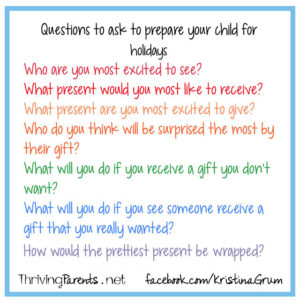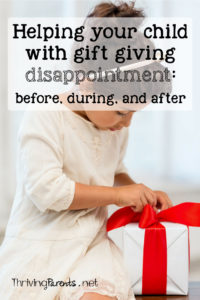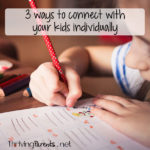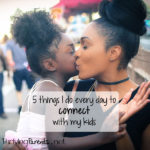Winter holidays are supposed to be a joyous holiday filled with faith, celebration, family, food, and gift giving.

If you have a child or children, you know it can also be filled with tears, frustration, tantrums, and loud voices. I think one of the biggest hurdles with holidays can be the difficulty and disappointment with gift giving. Children either want a gift someone else is getting, they don’t want to give a gift to someone because they’d prefer to keep it, or they’re disappointed because they received a gift they don’t like.
1. Here are some ways to help deal with gift disappointment ahead of time:
Asking questions
By asking your children some questions ahead of time, it gives them the opportunity to explore scenarios that they wouldn’t necessarily think about. It also prepares them to get more into the spirt of gift giving than into the mindset of receiving.
Here are some questions we ask before holidays:
- Who are you most excited to see?
- What present would you most like to receive?
- What present are you most excited to give?
- Who do you think will be surprised the most by their gift?
- What will you do if you receive a gift you don’t want?
- What will you do if you see someone receive a gift that you really wanted?
- How would the prettiest present be wrapped?

Role Playing
If your child has trouble with the idea of getting a gift that wouldn’t like, take the time to role play the scenario, using yourselves, dolls, or toys to act out the scenario. Take turns.
What this looks like:
“Let’s act out what will happen if you get something you really don’t want for Christmas. Let’s pretend someone gives you socks. I’m going to pretend to hand you the socks and you show me how you’ll react.”
You can also reverse this role play. “I’m going to pretend I got socks for Christmas. This is how disappointed I’ll be…” Then act out your disappointment channeling your best little kid tantrums (but not too over the top!). Then ask your child what you could have said or done instead of throwing a fit. This helps them recognize that should be done and also plants the seed that they may not like what they’re getting.
Drawing
Drawing can be a cathartic way for your child to deal with big emotions that are difficult to process. Have your child draw themself giving a friend or relative a gift or receiving a gift they didn’t want. This can help them process their emotions and prepare them for the event ahead of time.
2. Here are some ways to help deal with gift disappointment in the moment:
Remember what they’re capable of
Your child’s brain is not yet fully developed so even though you talk about the situation ahead of time, it doesn’t mean that they will automatically respond in a diplomatic way when the time comes. There may still be tears!
Remain empathetic
“I know you are disappointed in the gift you received.”
“I know you really wanted the present that Michael received.”
Their feelings are very real to them, even though as adults those feelings may seem silly and ungrateful to us. If you aren’t sure what empathy looks like, watch this quick video for a great explanation.
Be supportive
Help support your child by giving them the room to express themselves and when they are calm remind them to thank their gift giver.
What this looks like:
You may need to leave the room or just hold your child in a 6 second hug. Let them know it’s okay to be disappointed.
3. Here are some ways to help deal with gift disappointment afterwards:
Write or draw
Write or draw the gift giver a note of thanks. This helps kids remember that it’s important to always thank the person who is giving them a gift.
Make a plan
Ask your child to work with you to make a plan for next time. It’s so hard to be present in the moment and make the right decision, as adults, and it’s even hard for kids to do this. Now that they’ve experienced the disappointment (and maybe a not so great response to it), have them decide what they will do next time.
Make it better (doing a make-up)
If they broke or damaged anything while they were having a hard time, have them fix it. For example, if they knocked over something and broke it, have them earn money to replace it if it can’t be fixed. If they say hurtful words to someone, have them make a list of kind words about that person.
Apologize
If their disappointment hurt someone’s feelings, help them to apologize. You can practice what will be said ahead of time (just like a role play). Ask your child if they want your help in getting started. Remember that apologizing is very hard for children – in a different way than it is for adults. They take it very personally and often think they’re a bad person for their reaction. If your child is unable to apologize, you can apologize for them.
4. Here are some ways to handle our embarrassment:
It’s easy to feel embarrassed when our children behave this way. If the gift giver is someone who has children of their own, they’ll certainly understand.
Here are some things you can say
- We’re working on being more gracious.
- We’re having a hard time accepting disappointment.
- They’ve been focused on receiving a specific gift (that they may or may not be receiving from someone else).
- They loved what they picked out so much they are having a hard time parting with it
Kids often do the unexpected and every parent knows how easy it is for a child to be disappointed. They haven’t quite developed a filter yet, and it’s hard to mask their disappointment. By preparing them for gift giving events ahead of time, it’ll make these situations easier to handle.
What do you do to help prepare your child for the holidays?
xoxo
–k
Pin this to save it for later!



